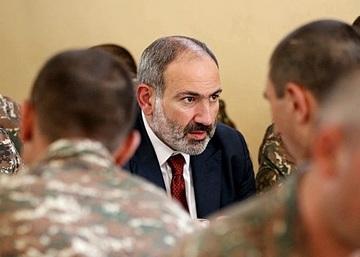Pashinyan against generals: reasons for the conflict

Political unrest continues in Armenia. Another reason for them was the dismissal from the post of First Deputy Chief of the General Staff of the Armenian Armed Forces, Lieutenant General Tiran Khachatrian, who sharply criticized the statement of Prime Minister Nikol Pashinyan about "non-working Russian Iskander". On February 25, in response to Pashinyan's dismissal of Khachatryan, the General Staff demanded in writing the Prime Minister's resignation, stating that the political leadership was not able to adequately carry out its professional activities.
The General Staff's statement had a significant political resonance, since the initiative to remove Pashinyan from power was personally made by the Chief of the General Staff of the Armenian Armed Forces Onik Gasparyan, whose dismissal proposal also soon appeared on the table of President Armen Sarkissian.
The topic of the army in Armenia has remained closed for the last quarter of a century - it was customary to idealize the Armed Forces for dubious achievements during the First Karabakh War. But the Second Karabakh War put everything in its place, dispelling the myth about the invincibility of the army. Pashinyan's current criticism was intended to change public opinion. The Armenian prime minister does not want to take responsibility for the defeat in the war for an infinitely long time, especially since the army has never been inclined to closely cooperate with his "revolutionary" government. The months of grief and mourning have passed, and the authorities, who have found themselves in the status of an outcast, have a need to draw people's attention to the actions of military structures, which have receded into the shadows in anticipation of a stabilization of the political situation. This is due to Pashinyan's uncertain remarks regarding the Iskander, whose purpose was not to expose the allegedly faulty Russian weapons, but to hint at the incompetence of the generals. The ruling bloc has demonstrated its unwillingness to single-handedly assume full responsibility for the military failure in Karabakh, especially for those military structures to which the "revolutionaries" have nothing to do.
The immediate reaction of the General Staff is a predictable response to the likely campaign of the political leadership. Sooner or later, the public had to put the issue squarely in relation to the Armenian generals who failed to protect the interests of Armenian separatism. The defeat of the army implies its speedy reformation, which will inevitably be accompanied by investigations, dismissals, and even the initiation of criminal cases. Taking into account such a prospect, the question arises who will carry out the reforms of the army: the current authorities, which will pursue the goal of rehabilitating themselves in the eyes of the public, or another political force, whose actions towards the generals will be superficial and nominal.
Pashinyan fears the military, since there are many supporters of the former authorities among them. The backbone of the top military leadership was formed during the presidency of the Karabakh separatists Robert Kocharian and Serzh Sargsyan. Kocharian's recent return to politics could be a signal for senior military officials to get involved in political processes. Pashinyan himself indirectly confirmed this, speaking to supporters in the center of Yerevan. But Kocharian does not hide his sympathy for the General Staff, which has appealed to the Armenian public to rally around the army and generals.
The crisis in relations between the authorities and the generals demonstrates an acute behind-the-scenes struggle between the political blocs of post-war Armenia. The pseudo opposition forces, the army and other suddenly activated patriots of Armenia are trying in every possible way to topple Nikol Pashinyan, who saved the "true patriots" from signing the peace statement on Karabakh so hated by them. The prime minister did all the "dirty work" and, paradoxically, the de-occupation of the territory of Azerbaijan and the peacekeeping mission of the Russian Armed Forces in Karabakh created more comfortable conditions for the political forces of Armenia rushing to power. An acute political struggle is being waged for this power under the new conditions, the participants of which are ready to plunge Armenia into the abyss of even greater chaos.
 Latest news
Latest news Latest news
Latest newsAram I: Mr. Erdogan, our ancestors were massacred by your ancestors, don't try to oppose diaspora to Armenia
24 April 2024 / 14:20
Azerbaijan and Armenia start border delimitation process
23 April 2024 / 11:38
Armenia premier: Our society asks why we continue to be member state of CSTO?
23 April 2024 / 11:30
Ilham Aliyev on his way to Moscow for talks with Vladimir Putin
22 April 2024 / 10:39
German Foreign Ministry reacts to agreement between Armenia and Azerbaijan on border delimitation
22 April 2024 / 10:32
Is Pashinyan going to attend Putin's inauguration?
17 April 2024 / 14:40
Russian peacekeepers’ pulling out from Nagorno-Karabakh has begun, Kremlin confirms
17 April 2024 / 14:34
Tokayev: Kazakhstan ready to offer platform for Armenia-Azerbaijan negotiations
15 April 2024 / 13:37
U.S. refuses to join Israel in retaliatory action against Iran
15 April 2024 / 11:33
Olivier Decottignies: France is providing Armenia military gear everyone’s desperate to get
09 April 2024 / 13:58
Ruben Vardanyan nominated for Nobel Peace Prize
08 April 2024 / 13:48
Serzh Sargsyan says Armenia-EU-US meeting will intensify Russia-West confrontation
05 April 2024 / 14:17
Pashinyan-Blinken-von der Leyen meeting underway in Brussels
05 April 2024 / 14:08
Aliyev expressed to Blinken Baku's dissatisfaction with the US-EU-Armenia trilateral meeting
04 April 2024 / 12:39
Peace process not the focus of Armenia-EU-US meeting – State Dept
02 April 2024 / 14:57

 27 April 2024 / 06:45
27 April 2024 / 06:45





